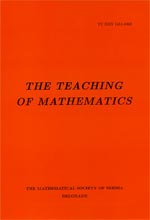
| Does the problem complexity impact students' achievements in a computer aided mathematics instruction? |
| Eugen Ljajko |
Abstract The paper deals with two aspects of a computer-based analytic geometry instruction: students' achievements, and achievement decay rates. A new mathematics learning environment---a dynamic and interactive one---is being built with introduction of computers and GeoGebra in the classroom. The subject material was introduced to the students mostly through GeoGebra dynamic worksheets. Students of the experimental and the control groups went through three tests within an eight-month period. The tests were different in terms of technology used by the experimental group and the two aspects we took into consideration. In the first two tests we observed students' achievements in different learning environments. The experimental group students showed a lower performance when solving problems in a non-computer environment than they did in a computer-based environment. However, we identified types of problems that are easier to solve in a computer-based environment, and others that do not necessary require computer usage to be quickly solved. This helped us formulate better strategies while choosing types of problems and appropriate ways and technologies to solve them. Parts of the third test helped us estimate achievement decay rates for both groups. Results indicate very close achievement decay rates for both, experimental and control groups. |
Keywords: GeoGebra; dynamic worksheets; analytic geometry; students' achievement decay. |
Pages: 41$-$55 |
Volume XIX , Issue 1 , 2016 |
